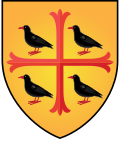Portal:University of Oxford
| Main page | Indices | Projects |
The University of Oxford portal
The University of Oxford is a collegiate research university in Oxford, England. There is evidence of teaching as early as 1096, making it the oldest university in the English-speaking world and the world's second-oldest university in continuous operation. It grew rapidly from 1167, when Henry II banned English students from attending the University of Paris. After disputes between students and Oxford townsfolk in 1209, some academics fled north-east to Cambridge where they established what became the University of Cambridge. The two English ancient universities share many common features and are jointly referred to as Oxbridge.
The University of Oxford is made up of thirty-nine semi-autonomous constituent colleges, four permanent private halls, and a range of academic departments which are organised into four divisions. Each college is a self-governing institution within the university, controlling its own membership and having its own internal structure and activities. All students are members of a college.
It does not have a main campus, but its buildings and facilities are scattered throughout the city centre. Undergraduate teaching at Oxford consists of lectures, small-group tutorials at the colleges and halls, seminars, laboratory work and occasionally further tutorials provided by the central university faculties and departments. Postgraduate teaching is provided in a predominantly centralised fashion.
Oxford operates the Ashmolean Museum, the world's oldest university museum; Oxford University Press, the largest university press in the world; and the largest academic library system nationwide. In the fiscal year ending 31 July 2023, the university had a total consolidated income of £2.92 billion, of which £789 million was from research grants and contracts.
Oxford has educated a wide range of notable alumni, including 30 prime ministers of the United Kingdom and many heads of state and government around the world. 73 Nobel Prize laureates, 4 Fields Medalists, and 6 Turing Award winners have matriculated, worked, or held visiting fellowships at the University of Oxford, while its alumni have won 160 Olympic medals. Oxford is the home of numerous scholarships, including the Rhodes Scholarship, one of the oldest international graduate scholarship programmes. (Full article...)
Selected article
The first Honorary Fellows of Keble College, Oxford, were elected in 1931, when the college's governing body was given power to elect "distinguished persons" to this position. Under the current statutes of the college, Honorary Fellows cannot vote at meetings of the Governing Body and do not receive financial reward, but they receive "such other privileges as the Governing Body may determine." Those elected have included college alumni (for example, the Pakistan cricketer and politician Imran Khan, elected 1988), benefactors (for example Sir Anthony O'Reilly, elected 2002), and individuals of distinction without academic links to the college such as former U.S. President Ronald Reagan (pictured) (elected 1994) and the poet Sir John Betjeman (elected 1972). The three longest-serving Honorary Fellows are Sir John Forsdyke (Principal Librarian of the British Museum; appointed 1937, died 1979), Sir Thomas Armstrong (conductor; appointed 1955, died 1994) and Harry Carpenter (Warden of Keble, later Bishop of Oxford; appointed 1960, died 1993). (Full article...)
Selected biography
Selected college or hall
St Edmund Hall, often referred to as "Teddy Hall", was established at some point in the 13th century, probably in about 1278. The college is named after St Edmund of Abingdon, Oxfordshire, the first known Oxford Master of Arts and the first Oxford-educated Archbishop of Canterbury, who lived and taught on the college site. The name St Edmund Hall (Aula Sancti Edmundi) first appears in a 1317 rental agreement. It was the last surviving medieval academic hall at Oxford, only obtaining college status in 1957, and retaining the term "Hall" for reasons of history. It is based on a small central site on the north side of the High Street: the old dining hall dates from 1659, the chapel and old library from the late 17th century, and the library is the 12th-century former church of St Peter-in-the-East. The college has about 375 undergraduates and 175 postgraduates. The Principal is the microbiologist Keith Gull. Alumni of the college include the comedians Terry Jones and Stewart Lee, the former England rugby international Stuart Barnes, the journalist and broadcaster Robin Day, and Ken Macdonald and Keir Starmer, former Directors of Public Prosecutions. (Full article...)
Selected image

Did you know
Articles from Wikipedia's "Did You Know" archives about the university and people associated with it:
- ... that endocrinologist Sir Raymond Hoffenberg was forced to leave South Africa in 1968 due to his opposition to apartheid, and was later President of the Royal College of Physicians and of Wolfson College (pictured)?
- ... that Christopher Chavasse was an Officer of the Order of the British Empire, a Bishop of Rochester, and an Olympic athlete?
- ... that, in 1987, Bolaji Akinyemi proposed the development of nuclear weapons by Nigeria?
- ... that historian Henry William Carless Davis once served as a member of the British contingent to the Paris Peace Conference in 1919?
- ... that future Canadian Senator John Gilbert Higgins hung black crêpe paper on his door in mourning the day that Newfoundland joined Canada?
Selected quotation
Selected panorama
Wikimedia
The following Wikimedia Foundation sister projects provide more on this subject:
-
Commons
Free media repository -
Wikibooks
Free textbooks and manuals -
Wikidata
Free knowledge base -
Wikinews
Free-content news -
Wikiquote
Collection of quotations -
Wikisource
Free-content library -
Wikiversity
Free learning tools -
Wikivoyage
Free travel guide -
Wiktionary
Dictionary and thesaurus















